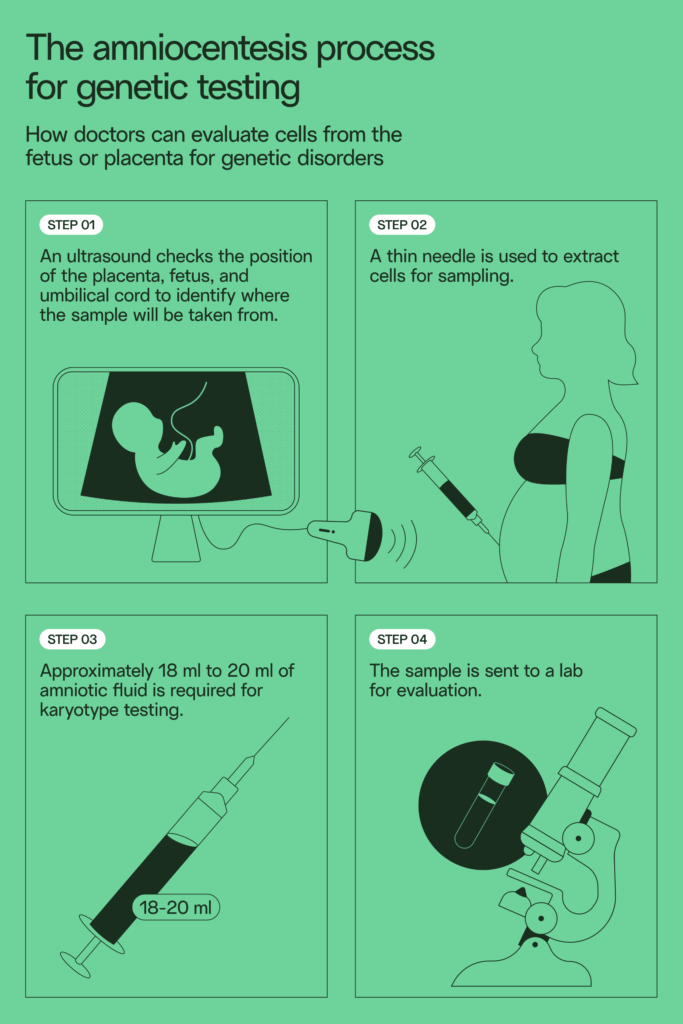If you have a family history of a genetic disorder, you may worry about passing the condition down to your child, even if you don’t have the disorder yourself. That’s where carrier genetic testing comes in.
Carrier testing looks for common genetic mutations in your and/or your partner’s DNA, to assess the risk of your child inheriting a genetic disease. This knowledge may help you decide how to move forward with a pregnancy, whether you choose to use in vitro fertilization (IVF) and screen for the disease, or continue with the pregnancy as originally planned.
We review how carrier genetic testing works, who should do carrier screening for genetic conditions, carrier testing costs, and what to do if you and your partner both test positive as carriers of a genetic disorder.
Key takeaways
- Carrier testing screens individuals for genetic mutations to reduce the risk that they’ll pass down a genetic disorder to their children. Even if you don’t have a genetic disorder yourself, you may still be able to pass one to your offspring, which is why a carrier genetic test is important.
- You may want to do a carrier screening test for genetic conditions if you have a family history of a genetic condition, or if you have a higher risk as a member of certain ethnic groups.
- If both parents carry a genetic mutation, they may opt to use in vitro fertilization and embryo genetic testing to lower the chance of them passing it down to their child.
What is carrier testing?
Carrier testing is used to screen individuals for genes that are linked to certain diseases or conditions. Carrier screening tests may be recommended if you or your partner have a family history of a genetic disorder or if you’re a member of an ethnic group with a higher risk of certain genetic conditions. However, know that the choice to undergo carrier genetic testing is up to you.
Even if you have no symptoms of a disease yourself, you may carry a gene that could be passed down to your children. This is important because, if your partner carries that gene too, your offspring could be born with the genetic illness. That’s why, if one parent is found to be a carrier, the other parent should undergo carrier testing as well.

You’ll usually undergo a carrier screening test for genetic conditions, which typically involves a simple blood or saliva test, before becoming pregnant. If both parents carry affected genes, the child has a 25% chance of getting the condition and a 50% chance of being a carrier like the parents.
| Chance of the child having the genetic disease | Chance of the child being a carrier for the genetic disease | |
| If both parents are carriers | 25% | 50% |
| If one parent is a carrier | – | 50% |
If both parents are carriers, they may opt to use in vitro fertilization (IVF) so the embryo can be tested for genetic mutations before being implanted in the uterus. If carrier genetic testing is done during pregnancy, you might consider testing your fetus if you and your partner are carriers.
What does carrier testing screen for?
Carrier testing typically screens for several genetic diseases, including:
- cystic fibrosis
- spinal muscular atrophy (SMA)
- fragile X syndrome
- thalassemia
- sickle cell disease
- Tay-Sachs disease
Carrier testing for cystic fibrosis and SMA is typically offered to all pregnant people, or people hoping to become pregnant, regardless of their family history.
While anyone can have a genetic disorder, some conditions are more prevalent within certain racial and ethnic groups, putting members of these groups at higher risk. They include:
- sickle cell disease in Black people
- Tay-Sachs disease in people of Eastern European Jewish, French Canadian, or Cajun descent
- thalassemia in people of Southeast Asian or Mediterranean descent
Keep in mind that genetic carrier screening tests don’t test for every possible genetic defect, so it’s still possible for your child to be born with a genetic disorder even if you “pass” the carrier testing.
Who should consider carrier testing when trying to conceive?
You may want to consider a carrier screening test prior to pregnancy if you:
- have a genetic condition
- have a family history of a genetic disorder
- are part of an ethnic group with a higher risk of certain genetic disorders
- have a partner who tested positive for a genetic mutation linked to a genetic disorder
Benefits of carrier genetic testing
Carrier genetic testing can help you determine whether your child is likely to inherit a genetic disease. Carrier testing can also help you better understand your own genetics and indicate if you are likely to develop the disease yourself, putting you on the path to pursue follow-up screenings, improve your health through lifestyle changes, or even freeze your sperm if the condition may affect your fertility. On the other hand, a negative carrier screening test result may provide a sense of relief about you and your family’s health.
With knowledge gained from the test about any genetic mutations you may carry, you and your partner can decide how to proceed with family planning, such as considering IVF or an egg or sperm donor.
If you’re having trouble conceiving, carrier genetic testing can also help diagnose genetic disorders that could be contributing to male-factor infertility.
When should I do carrier genetic screening?
Ideally, carrier testing will be done prior to pregnancy, so you can use the information to plan for how you’ll create your future family. However, in many cases, a carrier screening test isn’t done until a person is pregnant. In that case, carrier genetic testing is more useful as a way to guide prenatal testing for your fetus.
What can I do if my partner and I are both carriers for a disease?
If both parents are carriers for a disease, it increases the risk of passing the condition on to your child. In this case, you may consider additional testing or using donor eggs or sperm to reduce the chances of your child having the disorder.
Using IVF with PGD (PGT-M)
Preimplantation genetic testing for monogenic disorders (PGT-M), formerly known as preimplantation genetic diagnosis or PGD, is a form of genetic testing performed on embryos created through IVF. This testing is done before transferring embryo(s) to the uterus, to help a couple and their doctor select healthy embryos and lower the chance of delivering a child with a genetic disorder.
Sperm or egg donor or adoption
You may also consider using a sperm or egg donor along with fertility treatment. As long as the donor isn’t a carrier of the same genetic mutation, you or your partner will be able to have a biological child with reduced risk of a genetic disorder. Alternatively, some couples choose to adopt a child instead to sidestep the chance of passing on a genetic condition entirely.
Prenatal diagnosis during pregnancy
It’s helpful to have carrier testing done before you conceive a child, but if you’re already pregnant, you still have some options. Mainly, you can have prenatal diagnostic tests performed to check the fetus for the genetic disease.
Typically, your doctor will obtain cells from the fetus or placenta using an amniocentesis or chorionic villus sampling (CVS). An amniocentesis procedure uses a thin needle to withdraw amniotic fluid to obtain the cell sample, while CVS tests tissue from the placenta. These tests are more invasive than PGT-M and involve a very small risk of losing the pregnancy.
Prenatal genetic testing can also check for disorders like Klinefelter syndrome that occur through random genetic mutations and wouldn’t be found through carrier screening. Therefore, it’s more comprehensive than the results you’ll get from carrier genetic testing.

If only one parent is a carrier
If just one parent carries a gene mutation, it’s still important information for both them and their offspring. Carriers of some gene mutations, such as cystic fibrosis and fragile X syndrome, can have specific symptoms, such as reduced fertility — even though they don’t have the disease itself.
In addition, if either parent is a carrier, there’s a 50% chance that the child will be a carrier, as well. Therefore, they’ll likely want to undergo a carrier screening test with their own partners when they’re ready to have a family in the future.
Carrier testing costs
The cost of carrier genetic testing varies widely, ranging from under $100 to over $2,000. Carrier testing may be more expensive if you need multiple carrier screening tests or if several family members must undergo carrier testing.
Does insurance cover carrier testing?
Your health insurance may cover carrier testing. While it’s not a guarantee, it’s more likely if your doctor recommends the carrier screening test. Because it’s up to the insurance company, it’s best to check with your company in advance to confirm that they cover carrier genetic testing.
If you’re planning for parenthood: Check your fertility
Carrier testing is an important part of reducing the risk of inherited disorders and delivering a healthy child. Another essential aspect of building your family is understanding your fertility by testing your sperm to ensure they’re healthy.
Legacy offers an at-home semen analysis to help you easily and conveniently assess the health of your sperm, including sperm count, motility, and morphology. Understanding these parameters also gives you insights into improving your sperm health.
Gaining a better understanding of your genetic health and fertility can help you start your family, whether you’re ready to do so now or plan to preserve your sperm short-term or for future use.



